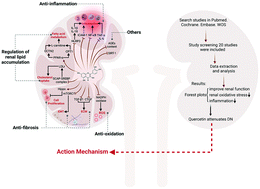The effect of quercetin on diabetic nephropathy (DN): a systematic review and meta-analysis of animal studies
Abstract
Quercetin, a flavonoid possessing numerous biological activities, is reported to improve renal injury in diabetic animals. Here, the aim of this systematic review and meta-analysis is to assess the effect of quercetin on diabetic nephropathy and summarize its possible mechanisms. We searched in four databases PubMed, Web of Sciences (WOS), Cochrane and Embase from inception to May 2021 and ultimately included 20 animal studies in this review. A total of 12 outcome measurements including renal function indexes, oxidative stress biomarkers and inflammatory cytokines were extracted for meta-analysis using RevMan 5.4 software. Apart from creatinine clearance and uric acid with no significant difference, quercetin significantly decreased the levels of renal index, serum/plasma creatinine (SCr), blood urea nitrogen (BUN), urine protein, urine albumin, malondialdehyde (MDA), tumor necrosis factor (TNF)-α and interleukin (IL)-1β, and increased superoxide dismutase (SOD) and catalase (CAT) activity. In short, quercetin improves renal function and attenuates the renal oxidative stress level and inflammatory response in DN animal models. Its possible action mechanisms include anti-oxidation, anti-inflammation, anti-fibrosis, and regulation of renal lipid accumulation.

- This article is part of the themed collection: Food & Function Review Articles 2022


 Please wait while we load your content...
Please wait while we load your content...